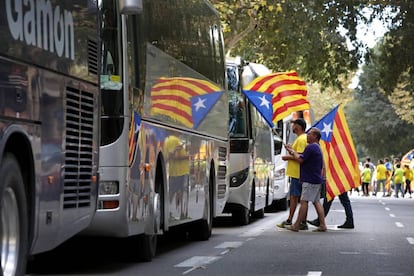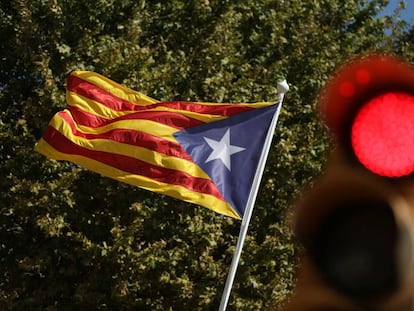Catalonia¡¯s bid for independence: how did we get here?
Despite rising pressure from the Spanish authorities, the regional government has not backed down on its plan for a referendum

There are just hours to go before Catalonia attempts to hold an independence referendum in the northeastern Spanish region, one that the Spanish courts have ruled illegal, and is fiercely opposed by the conservative Popular Party government in Madrid.
Thousands of Civil Guard and National Police officers have been drafted into the area in a bid to stop the vote from going ahead, under orders from the Spanish justice system. But politicians and citizens alike are determined that they should have their say on the future of Catalonia.
Catalan separatists used their slim majority in the regional parliament to enact legislation paving the way for the referendum
So how did it come to this?
Earlier this month, Catalan separatists used their slim majority in the regional parliament to enact legislation paving the way for the referendum and for a hypothetical transition into an independent republic.
The ruling Junts pel S¨ª coalition and its partner, the radical far-left CUP party, employed a unique method to push the bills through parliament in record time, skipping several procedural safeguards. The opposition walked out of the chamber in protest, accusing the government of commandeering parliament to achieve its independence goals with contempt for legal procedure.
The Spanish courts responded by suspending the Catalan laws and warning all public officials in the region that cooperating with the illegal referendum could entail prosecution for criminal offenses.
Mayors who pledged to cooperate with the vote by lending municipal premises were placed under investigation and were told to appear in court. Those who refused to show up risked arrest.
Police raids on September 20 raised tensions further, as 14 people were arrested ¨C most of them officials from the Catalan regional government ¨C and a number of buildings searched in an effort to locate material being prepared for the planned vote, such as ballot boxes and voting slips. A night of tension followed, as protestors took to the streets and faced off with the authorities. Some of these demonstrators were later accused of sedition.
But despite the rising pressure from the authorities, the plans for the vote have continued unabated. On Friday, the regional government held a press conference at which it presented the ballot boxes that would be used, and announced the numbers of polling places and voting stations there would be throughout the region. Members of the public began to occupy school buildings with the aim of preventing them being sealed off by the authorities ahead of their planned use as voting stations on Sunday. The regional Mossos d¡¯Esquadra police force, meanwhile, have been given orders to clear such buildings of members of the public at 6am tomorrow.
Tensions
In the run-up to the vote, tensions have spilled over to everyday life, eroding the social harmony in a region that is home to 7.5 million people, many of them immigrants from other parts of Spain and the world. Some mayors who publicly refused to cooperate with the referendum were targeted by secessionists and subjected to harassment and even threats. And non-nationalist Catalans have reported a constant low-key pressure to keep silent about their views or face ¡°civil death.¡±
Prime Minister Mariano Rajoy has been under pressure from the more hawkish circles in Madrid to ¡°bang his fist on the table¡± in the face of secessionist taunts. Earlier this month, the Popular Party (PP) leader issued instructions to ¡°keep a cool head¡± in order to prevent any kind of street conflict that could spark a wider crisis, said sources familiar with the situation. The politician, who is famed for taking a wait-and-see approach to such crises, has come in for widespread criticism for not getting ahead of the situation and, for the most part, his deafening silence.
Mayors who pledged to cooperate with the vote were placed under investigation and told to appear in court
In theory, the central government could have adopted ¡°the necessary measures¡± to force a regional government to obey the Constitution and national laws, as per section 155 of the Spanish Constitution. But this tool has never been used since Spain returned to democracy in the late 1970s.
Instead, Rajoy¡¯s strategy has been to use existing laws to stop the referendum from taking place by undermining its infrastructure and logistics. Earlier this month, he told the 55,000 citizens who have been selected by the Catalan government to staff the polling stations that they should not go, as the referendum is illegal. In a separate move, Madrid took control of the region¡¯s finances in order to ensure that public money was not being spent on the preparations for the poll.
Political reaction
In a rare display of unity in Spanish politics, opposition parties have for the most part closed ranks around the government. The Socialist Party (PSOE) has proposed a new ¡°federated¡± state structure that would acknowledge Spain¡¯s various ¡°nations¡± to a greater degree than the current system, but has not provided specific details about how this new structure would work.
The day after the raids in Barcelona, both the PP and the PSOE suggested that there could be talks about changes in the regional structure for Catalonia, either on October 2, or if the referendum were called off. Given that the latter situation has not come to pass, the central government is now ruling out any kind of discussions where regional premier Carles Puigdemont and his deputy, Oriol Junqueras, are the interlocutors.
Meanwhile, separatists have been taking their message abroad, portraying theirs as a struggle by a unified nation against an oppressive state and drawing comparisons with Kosovo. But the question remains of just how many Catalans support secession.
Opinion surveys suggest declining support for independence. A July poll conducted by the Catalan government¡¯s own Opinion Studies Center showed 41.1% in favor of splitting from Spain, down from 44.3%, while 49.4% were opposed to it.
Rajoy¡¯s strategy has been to use existing laws to stop the referendum by undermining its infrastructure and logistics
And at the recent pro-independence march on September 11, Catalonia¡¯s ¡°national day¡± or Diada, organizers estimated a turnout of one million people (police estimates were lower), compared with 1.8 million last year.
But Puigdemont, whose Junts pel S¨ª coalition and CUP together received 48% of the vote at the last regional election in 2015, feels that he has a popular mandate to break away from Spain.
If Catalonia finally holds its ballot, it will not be the first one. Around 2.3 million people voted in an informal ¡°participatory process¡± held on November 9, 2014 after the Spanish courts ruled a proper referendum illegal.
Although 80% voted in favor of independence, turnout was low ¨C there was an eligible voter pool of 6.3 million, according to the regional government¡¯s own figures ¨C and it was dismissed by international observers as lacking sufficient democratic safeguards.
Artur Mas, the Catalan premier at the time, was tried for disobedience in March of this year and barred from holding office for two years.
Puigdemont may be feeling that the time is now or never to make their break from Spain
Observers note that Madrid and Barcelona lost an opportunity to reach a deal over greater fiscal powers for Catalonia in 2012. At a time when Spain was in the grip of a vast economic crisis and corruption scandals were hitting politicians everywhere ¨C including several in Catalonia¡¯s Converg¨¨ncia party, which now governs under a new name as part of Junts pel S¨ª ¨C the Catalan government began to push the notion that an independent Catalonia would be rid of its problems.
The idea gained momentum, and that same year two million people turned out at the Diada to demand independence, while a November 2012 survey showed 57% support for secession. But as Spain itself pulled out of the crisis, surveys started to show a decline in support, and Puigdemont may be feeling that the time is now or never to make their break from Spain.
But given the latest events, a negotiated solution that is acceptable to all parties seems like an increasingly distant goal.
English version by Susana Urra.
Tu suscripci¨®n se est¨¢ usando en otro dispositivo
?Quieres a?adir otro usuario a tu suscripci¨®n?
Si contin¨²as leyendo en este dispositivo, no se podr¨¢ leer en el otro.
FlechaTu suscripci¨®n se est¨¢ usando en otro dispositivo y solo puedes acceder a EL PA?S desde un dispositivo a la vez.
Si quieres compartir tu cuenta, cambia tu suscripci¨®n a la modalidad Premium, as¨ª podr¨¢s a?adir otro usuario. Cada uno acceder¨¢ con su propia cuenta de email, lo que os permitir¨¢ personalizar vuestra experiencia en EL PA?S.
?Tienes una suscripci¨®n de empresa? Accede aqu¨ª para contratar m¨¢s cuentas.
En el caso de no saber qui¨¦n est¨¢ usando tu cuenta, te recomendamos cambiar tu contrase?a aqu¨ª.
Si decides continuar compartiendo tu cuenta, este mensaje se mostrar¨¢ en tu dispositivo y en el de la otra persona que est¨¢ usando tu cuenta de forma indefinida, afectando a tu experiencia de lectura. Puedes consultar aqu¨ª los t¨¦rminos y condiciones de la suscripci¨®n digital.










































